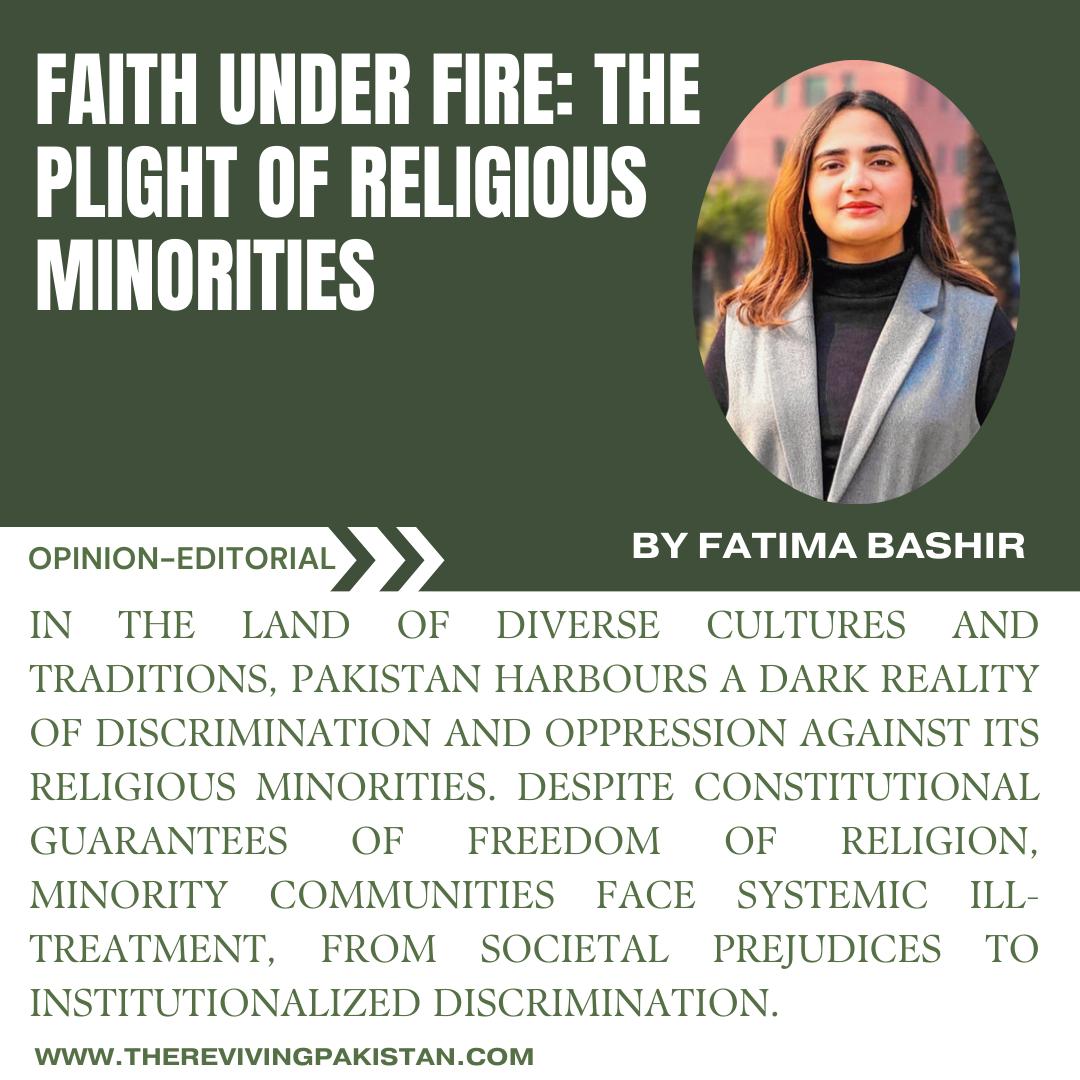About the Author(s)

Fatima Bashir
The author is a student of International Relations at the University of Central Punjab, with a passion for law, politics, and staying up-to-date on current events. She is dedicated to exploring the connections between global issues and their impact on our world.
In the land of diverse cultures and traditions, Pakistan harbours a dark reality of discrimination and oppression against its religious minorities. Despite constitutional guarantees of freedom of religion, minority communities face systemic ill-treatment, from societal prejudices to institutionalized discrimination.
Since 1947, there have been numerous noteworthy incidents in Pakistan’s history where minorities have been marginalized or subjected to prejudice. When anti-Ahmadiyya riots started in Lahore in 1953, sectarian violence erupted, resulting in multiple fatalities and injuries. Political and religious tensions sparked the riots, which led to the declaration of martial law in the city. Mass murder, sexual assault, and forced conversions were among the crimes performed against Bengali Hindus during the Bangladesh Liberation War, which resulted in the establishment of Bangladesh. The persecution of Hindu families by the Pakistani military and its local allies forced many of them to flee to India as refugees. Religious minorities, especially Christians and Ahmadis, were further marginalised when blasphemy laws were introduced in Pakistan in the late 1980s. These laws have solely been weaponized against minorities and other sects of Pakistan.
Following their departure from the Indian subcontinent, British colonisers split the area into two sovereign republics, Pakistan and India, which were established as states for Muslims living on the subcontinent. Non-Muslims, such as Christians, Hindus, Sikhs, Ahmadis, Kalash, Zoroastrians, and so forth, are regarded as a minority under Pakistan’s constitution. They made up 20% of the population at the time of the split. minorities now only make up 3% of Pakistan’s 235.8 million population. Government figures show that approximately 96 percent of Pakistanis are Muslims. Pakistan’s religious freedom was scored a 1 out of 4 by Freedom House in 2022, pointing out that blasphemy laws restrict the freedom of expression of Christians and Muslims, particularly Ahmadis, and are frequently used by religious vigilantes.
The US commission on international religious freedom publishes its annual Reports, which includes a chapter on Pakistan. According to it’s report of 2022:
The state of religious freedom in Pakistan is further deteriorating in 2022, With religious minorities facing regular threats and attacks such as blasphemy allegations, targeted assassinations, lynching, mob, Violence, forced conversions, and Defilement of graves and places of worship. Due to the rise of Sunni Islamist extremism and the ongoing threat of persecution through discriminatory laws like blasphemy laws and anti-Ahmadiyya laws, members of the Shi’a Muslim, Ahmadis, Christians, Hindus , and Sikh communities are subject to more severe forms of discrimination from society. These rules have made it easier for islamist radicals to target non-believers and other people with different beliefs, as well as religious minorities, by allowing them to operate with Impunity. In 2022, the prime minister Shahbaz Sharif’s new administration also weaponized the biased blasphemy laws, which have historically been used to target religious minorities.
The minorities in Pakistan are still facing discrimination and mistreatment . On 25th May , a Christian man was lynched by a mob over a desecration allegation n Sargodha. A mob attacked the Christian community in Jaranwala, Pakistan, on August 16, 2023, using accusations of blasphemy as justification. They destroyed Christian holy texts, homes, and churches with fire. This is not the first time that such an incident targeting minority communities has occurred in Pakistan over the previous thirty years. Every year, around 1,000 girls in Pakistan are coerced into becoming Muslims, frequently by means of kidnapping or fraud . The number of forced conversion cases increased by 80% in 2021 compared to 2020 and by 50% in 2021 compared to 2019, according to the Centre for Social Justice Lahore. There were at least 136 recorded occurrences of abduction and forced conversions in Pakistan between January and December 2023, primarily affecting minority girls and women. There were 110 Hindus and 26 Christians among them; the majority of the occurrences occurred in Sindh (107), Punjab (28) and Balochistan (1). Of the girls who had been abducted, 102 had been converted, and 34 were still missing. Several criminal offences, such as assault, kidnapping, and forced marriage, are frequently committed in these circumstances.
In short, Pakistan’s minorities have been facing this treatment since it’s inception. There should be a multipronged strategy to stop minorities in Pakistan from being mistreated . Proper implementation of laws that specifically protect minority rights and penalise acts of discrimination or violence against them should be the top priority for legal reforms. public awareness campaigns on the importance of religious tolerance and respect for minority communities must be initiated to counter the illiterate extremists who are responsible for unjustified or undue violence in society. The law enforcement personnel should undergo specialised training to handle the law and order situations in cases of Minorities. Outreach initiatives may be taken that engage the minorities in decision making processes directly .

